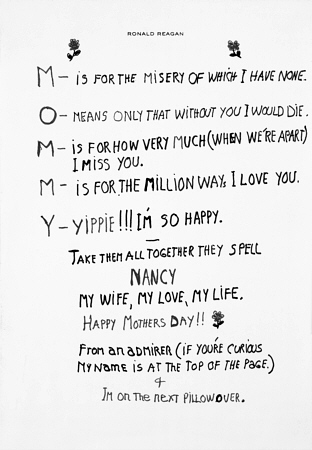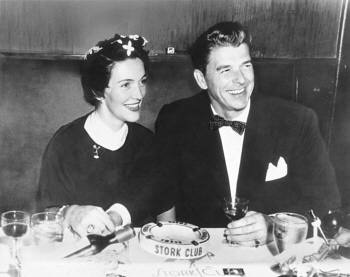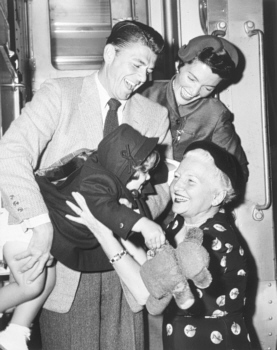I Love You, Ronnie (5 page)

Time was not a healer.—When dinner time finally arrived I walked down to “21” where I ate in lonely splendor. It was at this point with self pity “coming up fast on the rail” that you joined me.
Yes you and I had Roast Beef although 21 is one of those places
we’ll have to say “Well done.” Medium to them means “sponge off the blood.”
Wanting only a half bottle of wine we were somewhat restricted in choice but we politely resisted the “huxtering” of the wine steward (who couldn’t pick sweet milk from vinegar) and settled for a ’47—“Pichon Longueville.” It was tasty, wasn’t it? And I thought the most amusing incident (and the nicest) was when the lady to my left leaned over and apologizing for her boldness introduced the distinguished gentleman with her (whose name of course we didn’t hear) It seems he is the publisher of “Gourmet Magazine” and they were so surprised (as they put it) to see some one choosing a wine so carefully
and
so intelligently in “21” of all places that they just had to remark about it.
I of course told them I wasn’t really a gentleman I just happened to marry a lady.
The people on our right we ignored completely. A slick latin looking joker with a doll “by Jelke out of Jail” and a Brooks Brothers character who was evidently a Fond Fathers junior partner with plenty of loot he never could earn for himself. I was sure the Latin was peddling the “broad” or a TV idea until he raised his voice a little and so help me he was promoting backing for a “smart” old ladies home he wanted to establish. He knew the world was full of young couples burdened with aging Mommas who would leap at a chance to stable them in his “nifty new Home for Chromos,” and the pay off would top “South Pacific.”
We walked back in the twilight and I guess I hadn’t ought to put us on paper from there on. Let’s just say I didn’t know my lines this morning.
Tonight I think we’ll eat here at the hotel and you’ve got to promise to let me study—at least for a little while.
I suppose some people would find it unusual that you and I can so easily span three thousand miles but in truth it comes very naturally. Man can’t live without a heart and you are my heart, by far the nicest thing about me and so very necessary. There would be no life without you nor would I want any.
I Love You
“The Eastern Half of Us.”
Though life was sometimes difficult in our early years together, Ronnie never let on that he was worried or upset. I knew he sometimes was—I just knew—but he never said anything outright. It just wasn’t his way. Instead, he always tried to use humor to get through things.
In this letter, though we didn’t know it yet, there was light at the end of the tunnel: the TV guest spot Ronnie mentions for General Electric.
RONALD REAGAN
HOLLYWOOD, CALIFORNIA
Dear “Career Girl”
I missed you!
There is nothing new to report on my own problems.
I missed you!
One offer at Las Vegas is for Feb., one for May. We are waiting to see the outcome of the “F.B.I.” picture before accepting one or the other.
I missed you!
I may get a TV guest spot for General Electric soon.
I missed you!
Will see you as soon as this clam bake is over.
I love you—
Pauvre Petite Papa
P.S. It rained!
The Las Vegas nightclub job came to Ronnie in February 1954, through his agent, Taft Schreiber, at MCA. Ronnie was asked to spend a few weeks emceeing an act with a group of performers called the Continentals.
Las Vegas wasn’t really our kind of place, but we needed the money. We showed up, I recall, with a suitcase full of books. When the hotel owner went up to our room and saw them, he said, “I’ve never known anybody to come to Las Vegas with
books
before.” He probably thought we wouldn’t last.
But the Continentals turned out to be a very nice group of men—they were all married, and all of them had children. Ronnie got along wonderfully with them. In fact, while rehearsing, they got along so well that the group asked Ronnie to play a bigger role in their act. He did—and the show was a great success. People lined up in the street to get in.
After Ronnie’s tour in Las Vegas was up, the hotel asked him to come back for Christmas, but he said no. No matter how well things had gone, we didn’t want to be in Las Vegas for Christmas. Then, the Continentals presented me with a cup, because I’d never missed a performance—I went to each of the two shows every night for a couple of weeks. I never got bored.After all, as I knew from my theater days, every audience is different, and that makes for a different performance each time.

A note from Yearling Row, our ranch in the 1950s.
Normally, after a show, Ronnie and I would go back up to our room and read until it was time for the next one. But on the last night we decided to go instead to the casino. As we walked in, the nice hotel manager made a beeline for us, and cut us off.
“What are you doing?” he asked.
We said we just thought we’d do some gambling.
“No, no,” he said. “Don’t. I’ve seen too many people lose everything here. Go back!”
“We’re only going to gamble twenty dollars,” Ronnie told him.
“Well, okay,” the manager said. “But no more!”
He was really looking out for us. It felt like a nice way to leave Las Vegas, capping off happily what could have been a very difficult time.

A Mother’s Day greeting.
A
fter the Las Vegas trip, Taft Schreiber called with more good news: General Electric had come through with an offer for Ronnie to host a new television drama,
General Electric Theater.
Ronnie would introduce each episode, star in four programs a year, and act as “corporate ambassador” for G.E., going around the country visiting plants and offices. The idea was that he could talk about G.E. products and answer questions about the company to G.E. employees and local businessmen.
It seemed like a great opportunity. TV wasn’t considered so terrible anymore by the mid-1950s, and
General Electric Theater
promised to be a prestigious show. The G.E. job also would turn out to be a turning point in Ronnie’s life—but we didn’t, of course, know that then. We also didn’t realize how much traveling Ronnie would have to do.
—
Ronnie’s first tour for G.E. was scheduled for August 1954. But first, in July, he went to Glacier National Park, to make the RKO western
Cattle Queen of Montana
with Barbara Stanwyck, director Allan Dwan, and producer Benedict Bogeaus.

At the Stork Club. I’m wearing the T
UESDAY
’
S
C
HILD
pin Ronnie gave me when Patti was born, on a Tuesday.
Patti was not yet two years old. When she was born, on a Tuesday, Ronnie had given me a
TUESDAY
’
S CHILD
pin, accompanied by a note that read: “So you won’t have to be too far from our ‘Tuesday’s child,’ ever. And because I intend to be as close to both of you as Eggs are to Easter.” It was very hard for him to be away from us both that summer. And we were miserable being separated from him, too.
And so he wrote, to cheer us all up. Often, he wrote about nature, which he loved, and I think he actually perceived it differently—more intensely, perhaps—than many people do. I remember, for example, how at the Santa Barbara ranch we’d ride uphill and he’d admire the way the trees looked in silhouette against the sky.
—
From my own experience in pictures I knew that sometimes on a movie set a team works well together, and sometimes it doesn’t. As Ronnie described it,
Cattle Queen
was not a happy situation.
July 13 [1954]
A
.
M
.
My Darling
The first day of shooting and like all first days I can’t tell you good bad or indifferent. Everything is hectic and upset what with the truck caravan arriving from L.A. in the dark last night. Most of the morning was spent getting the trucks unloaded and the equipment straightened out. Ben B. is on hand so things can really get buggered up. I think Alan D. is trying to get some of the story holes plugged and this morning changed one scene “à la” a suggestion from “guess who.” However, our opposition is B.B. himself so I only whisper in an off-ear and let them fight it out. So far “Lady S.” is no help—taking the attitude of “who cares in these kinds of pictures.”
However there is one golden glow warming my soul in this first sunset—I’m twenty-four hours closer to you. Last night was an
other one of those nights—just too beautiful to stand. So tonight I’ll probably be looking at the Moon which means I’ll be looking at you—literally and figuratively because it lays far to the South of this mountain top and that’s where you are. That takes care of the “literal” part—the “figurative” part requires no direction, I just see you in all the beauty there is because in you I’ve found all the beauty in my life.

My mother welcoming Patti, Ronnie, and me to Chicago for a visit.
Please be careful and don’t get too good at covering your own shoulder at night—I’d miss doing it. Be careful in every other way too—nothing would have meaning without you.
Now if two “Muffins” I know will exchange a kiss for me—my good night will have been said.
I love you
Ronnie
The constraints of working on a low-budget picture wore on Ronnie as time went on. He wanted to be at home. He missed us and all the little things we shared in our happy life together—things like the “Bermuda Bell,” as he writes in this next letter.
The Bermuda Bell was something we had on the floor of our car that you could ring with your foot. It was one of our family rituals that in the evenings, Patti and I would sit at the little table in her room, and when Ronnie came home, he’d come up our circular drive and ring the bell, and we’d wave to him together from the window.
